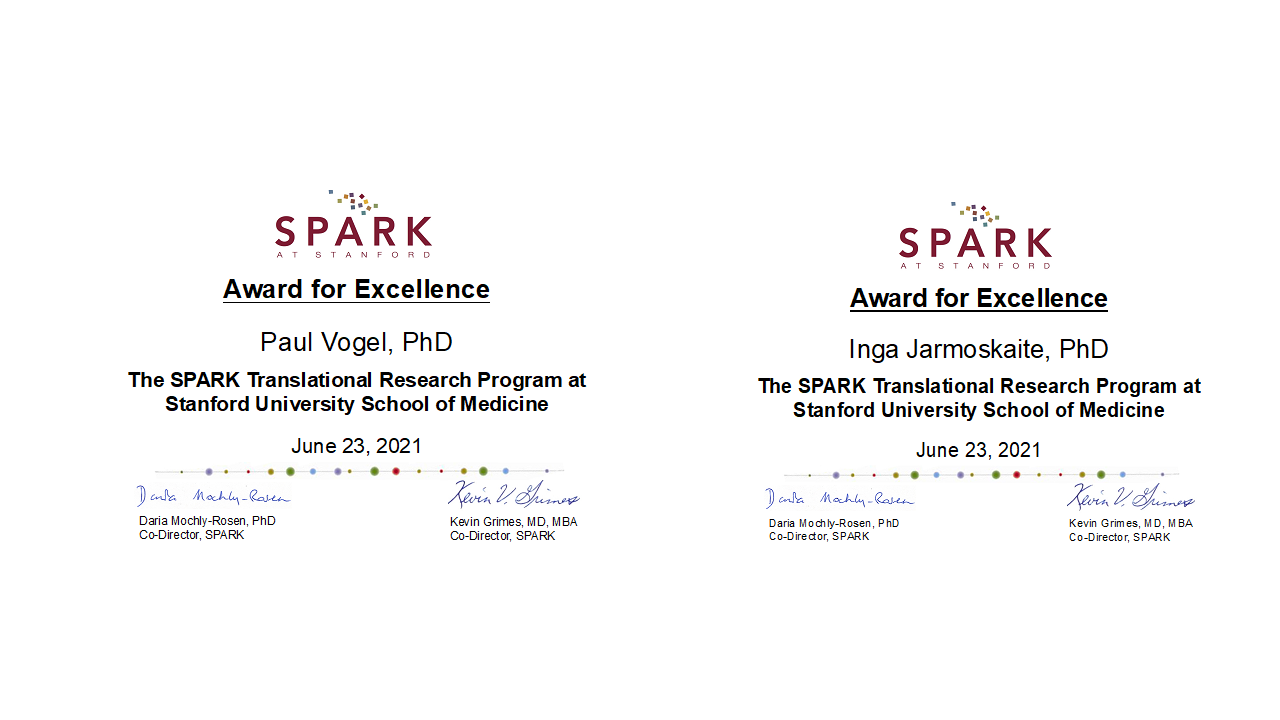
Paul Vogel and Inga Jarmoskaite receive SPARK Award for Excellence
Posted on July 1st, 2021
Congratulations to SPARK Scholars Paul Vogel and Inga Jarmoskaite, who were awarded the 2021 SPARK Award for Excellence!
Dr. Vogel and Dr. Jarmoskaite were honored in recognition of their outstanding contribution to develop therapeutics using an ADAR editing approach. The annual Award for Excellence is given by SPARK at Stanford to scientists that have achieved significant progress toward their research goals. SPARK co-director Kevin Grimes presented Paul and Inga with the awards at SPARK’s Wednesday evening meeting on June 23.
Along with principal investigator Jin Billy Li, Vogel and Jarmoskaite’s SPARK project aims to use endogenous ADAR for therapeutic transcriptome engineering to treat pediatric genetic diseases. The team is focused on treating two pediatric diseases, AAT deficiency and Hurler syndrome, that are caused by G-to-A point mutations in the transcriptome. The two pediatric diseases affect thousands of children worldwide, and treatment options are limited.
The approach uses antisense oligonucleotides (ASOs) that enable site-specific repair of point mutations by recruiting the RNA editing enzyme ADAR (adenosine deaminase acting on RNA). For AAT deficiency and Hurler syndrome, the ADAR editing approach aims to correct the disease phenotypes by converting adenosine to inosine.
Vogel, Jarmoskaite and Li’s SPARK project is focused on the design and in vivo delivery of ADAR-recruiting ASOs to treat AAT deficiency and Hurler syndrome. The team expects the project’s high-throughput ASO screens and animal studies will provide an understanding of how to use transcriptome engineering with the highest possible therapeutic efficacy, “bringing us a step closer to a powerful treatment for both diseases where currently only unsatisfactory treatment options exist,” said Li.
Grimes said, “Paul and Inga are truly deserving of this recognition. Under Dr. Li’s guidance, they are developing a truly innovative therapeutic approach that holds great promise for patients, mostly children, suffering from genetic diseases caused by single point mutations that can be corrected through RNA editing. There is tremendous clinical need for effective treatments and the team has made remarkable progress in advancing their research towards clinical study.”
Permalink: https://sparkmed.stanford.edu/paul-vogel-and-inga-jarmoskaite-receive-spark-award-for-excellence/
